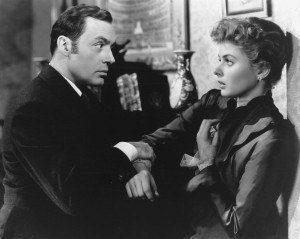
Gaslight
Last weekend I watched the classic movie, Gaslight. For those of us who have been in a relationship with a sociopath, it is a great reminder that we weren’t imagining things and how good these puppeteers are at what they do. We were not paranoid, or too sensitive, or unable to take a joke, or fill in the blank. We were being purposely manipulated and deceived by someone who never loved us, has no ethical rudder; and, at our expense, was using us for their personal gain. To weaken us in order to achieve those goals, the sociopath has many tools that go beyond gaslighting—making us question our own reality.
Ironically, the flickering of gas lights that Paula observes in the movie, but which she starts to believe she must be imagining, is not part of the gaslighting in which her husband, Gregory, engages. My understanding is that it simply reflects that, unbeknownst to Paula, her husband has secretly turned a light on to search the attic, and that makes the gas lights in the rest of the house flicker, as the use of gas in the houses changes. The same thing happens when he turns off the light to stop searching the attic. But, her plotting husband has done such a good job in making her question her memory and her own reality that her self-doubt generalizes to other things in her life. Did the gas light just go up or down? Was I imaging it? I just don’t know!
Gaslighting generalizes to an overall erosion of confidence and clarity
Gregory has purposely eroded her confidence in her memory and her “reality” by accusing her of not remembering things he “told” her, when, in fact, he’d never told her the information to begin with. He repeatedly accuses her of being forgetful. He gives her a broach, then takes it when she is not looking, so she thinks she’s lost it. He removes pictures and hides them, telling her that she is the one who must have done it, and makes her sit through the awkward questioning of servants. If they say they didn’t move the picture, and he says he didn’t, then Paula must have, even though she has no memory of doing so. It must be her because of all the other “evidence” of her poor memory and odd behavior. Paula doesn’t have a chance.
The tools used to control Paula in the movie mirror real life
Having experienced an unwitting long-term relationship with a sociopath (described in my memoir), what I find particularly brilliant about the film is that it also captures so many of the other tools in the sociopath’s toolkit and qualities of the relationship between a sociopath and a target. 
Specifically, Paula is portrayed as a very kind, empathetic woman; she has recently suffered the loss of someone she loves (her aunt who brought her up after Paula’s parents died); and she has something Gregory wants—she’s inherited her aunt’s estate, which Gregory wants to search for missing jewels. All of these make Paula a target. In addition, often true to life in such relationships, there is quick and immediate attraction (red flag). Paula thinks she has found her soulmate (red flag), and they quickly marry (red flag). Then everything changes (red flag). Gregory starts to use so many of the insidious tools in sociopaths’ toolkits —severe isolation of Paula, triangulation (her husband flirts with the maid and denies it), and typecasting (accusing Paula of flirting with the detective that she doesn’t even know) so she will work harder to prove that she has not done this by being even more socially isolated and even more devoted to her husband.
Additional tools in the sociopath’s toolkit
Her husband shifts to exuding superiority, withholding love as a manipulative tool, conditional love (I’ll only show you love if you bend to my will), and intermittent love (creating an addictive relationship). He starts making decisions for Paula because she is ostensibly becoming too frail and unreliable. He becomes almost enraged with her at times, which makes her afraid and even more submissive. There are flashes of contempt toward her for the weak woman that she’s become, further hacking at her self-esteem. But if ever asked, he’d deny anything but love and concern for Paula. He manipulates Paula in private and is kind and gracious to others in public so that Paula has no one to confirm her new reality and could easily conclude that she really is the problem in the relationship because he treats everyone else so kindly and they all think he’s wonderful. In fact, others are being manipulated into being character witnesses for him.
Unapologetic Pathological Lying
Of course Gregory lies pathologically, but how would Paula know? He’s even married to someone else and has used an assumed name to court and marry Paula. Like the sociopath that he is, he even lies boldly when caught. Once he’s apprehended with the stolen jewels (by the way, we find out that he murdered Paula’s aunt while trying to find and steal the jewels) and restrained by the police, he still tries to convince Paula of his innocence and implores Paula to help him escape.
When Paula learns of the totality of her husband’s deceit, she still loves him and, and at first, wants to defend him. Yet, after the trusted detective gives her even more information about her husband’s other wife and life Paula says,
“If it were true, then from the beginning there would have been nothing. Nothing real from the beginning.”
The devastating reality that it was all a con
There are so many horrific and destructive elements that form the constellation of a relationship with a sociopath, but this is a big one. It’s the realization people like this really exist, they are hard to detect, and that it all was a lie—every bit of it. All the love, all the sacrifices, all the time, all the compromises you made and invested in a relationship were never valued and all amount to nothing. You were never loved, you were simply conned and played to be discarded when the sociopath had what he or she wanted. You cannot get the time back to reinvest that time in your life and in other choices and relationships. It’s just gone.
Often there is no clean happy ending
In the movie, someone helped Paula, and Gregory is taken to jail where he will not be able to harass her. She’s still a wealthy woman, and they have not had children together. Unfortunately, this is not how many actual relationships with sociopaths “end.” They have all the same emotional devastation and betrayal as in Gaslight, but the nightmare continues for many of us—toxic divorces, alienated children, stalking, financial difficulties or devastation, co-parenting with a sociopath, smear campaigns, the list goes on. “Endings” in real life are often devastating, as in the classic fairy tale of Little Red Riding Hood. Most relationships with sociopaths don’t end well!
If you need a reminder of how brave and strong you are to have survived a relationship with a sociopath and to be managing through it, watching or rewatching Gaslight is highly recommended. But, make sure you are ready for it and it won’t be retraumatizing. I know that after I divorced my sociopathic ex-husband and continued through a nightmare of post-divorce personal and legal harassment, it took a year or two until I felt strong enough to watch the move. But now there’s a hint of satisfaction that, although I’d never choose that path, I survived it, I learned from it, and I’m moving onward the best I can.
Identifying names, places, events, characteristics, etc. that I discuss here and in my books have been altered to protect the identity of everyone involved.




































 Sociopath exerts control by holding important people and events hostage
Sociopath exerts control by holding important people and events hostage
Hope Springs
This is such a great post.